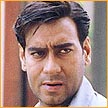
|
Whither hero worship?
With conventional heroes playing villains, how does the audience distinguish between good and bad?
|
Subhash K Jha
A very strange phenomenon occurs in writer-director Anees Bazmee's just released thriller Deewangee. Every time Ajay Devgan socks Akshaye Khanna in the climax the audiences roars, "Saale ko aur maar (hit the b*&^%$#)."
The scenario takes us back to the era of Shatrughan Sinha wo would get all the applause while beating up conventional heros like Jeetendra and Anil Dhawan in Bhai Ho To Aisa and Samjhauta, respectively. There came a time when no leading man was willing to share the marquee with this natural born scream stealer.
The tables have turned rather neatly since the days of Shatrughan Sinha. Conventional leading men do not only avoid the Shatrughan Sinha Syndrome, they want to play Shatrughan Sinha, and far more viciously than he ever imagined.
In Bazmee's Deewangee, Ajay Devgan cloaks himself in the mantle of big-time diabolism. As a murder accused awaiting trial, Devgan's eyes squint into a mean, evil grimace as he uses the most derogatory expletives on his psychiatrist Seema Biswas. In another sequence, he brutally assaults the leading lady's best friend Tanaaz Currim when she questions his moral right to marry the woman he loves.
In the climax, Devgan gets a chance to wallop furious punches on Khanna. And every time he does that, audiences clap and cheer lustily.
Khanna has no reason to feel wretched. Just a few months ago, he was busy beating the living daylights out of Bobby Deol in Abbas-Mustan's Humraaz and lusting after the other man's wife, Amisha Patel.
What happened to good old heroic hi-jinx? Nowadays, every leading man from Akshay Kumar to Akshaye Khanna covets the chance to be wicked on screen. And we are not talking about minor transgressions but major sins committed with lipsmacking relish. There is a deep breach in the moral demarcations between Good and Evil thanks to this disturbing glamourisation of evil. In Aankhen, the audience cheered megastar Amitabh Bachchan as he got into a devious mould to plan a bank robbery.
While in earlier decades, leading men like Dilip Kumar in Mehboob Khan's Amar and Sunil Dutt in the same director's Mother India, there was a moral resonance to evil deeds neatly rounded off by a suitably sticky ending. Now in Anees Bazmee's Deewangee Ajay Devgan does not have to be humbled or even killed. We are told that the perpetrator of monstrous evil could well be alive and kicking up a ruckus in some part of the world.
The neo-diabolism started with Shah Rukh Khan in Yash Chopra's Darr where much to the chagrin of the official hero Sunny Deol the psychotic antagonist got all the punch lines and the punches. In the climax Khan did get beaten to a pulp. But in several centres, Khan's blow-by-blow chastening was drastically edited out after the audiences objected to the character's roughing up.
The volume of leading men doing negative roles has since multiplied. Donning the diabolic attitude is almost become a pre-condition for sustained stardom. Though a few leading men like Hrithik Roshan still refuse to play the bad guy everyone else from Amitabh Bachchan in Aankhen to Vivek Oberoi in Company is to the bad wagon.
Ajay Devgan's inducing misdemeanours in Anees Bazmee's Deewangee raises a very crucial point: how does the majority of the audience distinguish between good and evil?